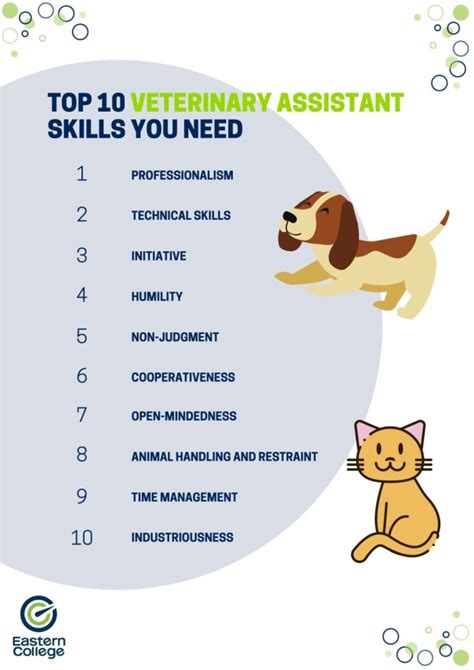As a veterinary technician, having the right skills is crucial to providing top-notch care to animals and supporting veterinarians in their work. With the ever-evolving field of veterinary medicine, it's essential to stay up-to-date on the latest techniques, technologies, and best practices. In this article, we'll explore the top 10 essential vet tech skills to master, including practical tips and examples to help you enhance your skills and advance your career.
Understanding Animal Behavior
Veterinary technicians play a vital role in observing and reporting animal behavior, which is critical in diagnosing and treating medical conditions. To develop this skill, observe animals in different situations, note their body language, and learn to recognize signs of stress, pain, or anxiety. Understanding animal behavior will help you provide better care and ensure the safety of both animals and humans in the clinic.

Effective Communication
Good communication is essential in any healthcare setting, and veterinary clinics are no exception. As a vet tech, you'll need to communicate effectively with pet owners, veterinarians, and other staff members. Develop your communication skills by practicing active listening, asking clear and concise questions, and providing empathetic and informative responses.
Medical Terminology
Familiarity with medical terminology is crucial in veterinary medicine. Take the time to learn and understand common medical terms, abbreviations, and acronyms. This will help you accurately document patient information, communicate effectively with veterinarians, and provide better care.

Pharmacology and Medication Administration
Vet techs play a critical role in administering medications and monitoring their effects. Develop your knowledge of pharmacology by studying the different types of medications, their uses, and potential side effects. Practice administering medications safely and accurately, and learn to recognize signs of adverse reactions.
Clinical Laboratory Procedures
Clinical laboratory procedures are essential in diagnosing and monitoring medical conditions. Develop your skills in collecting and processing samples, operating laboratory equipment, and interpreting test results. Stay up-to-date on the latest laboratory procedures and technologies to provide accurate and timely results.

Anesthesia and Pain Management
Anesthesia and pain management are critical components of veterinary care. Develop your knowledge of anesthetic protocols, pain management strategies, and patient monitoring techniques. Practice administering anesthesia safely and humanely, and learn to recognize signs of pain or discomfort.
Surgical Assisting
Vet techs often assist in surgical procedures, so it's essential to develop your skills in this area. Learn about surgical instruments, sterilization techniques, and patient positioning. Practice assisting in surgeries, and develop your knowledge of surgical procedures and protocols.

Dental Care and Procedures
Dental care is a critical component of veterinary medicine, and vet techs play a vital role in providing dental care and assisting in dental procedures. Develop your knowledge of dental anatomy, dental procedures, and patient care. Practice providing dental care, including cleaning, radiology, and surgery.
Imaging Technologies
Imaging technologies, such as radiology and ultrasonography, are essential in diagnosing and monitoring medical conditions. Develop your knowledge of imaging technologies, including equipment operation, patient positioning, and image interpretation. Practice using imaging technologies to provide accurate and timely results.

Electronic Medical Records
Electronic medical records (EMRs) are becoming increasingly common in veterinary clinics. Develop your skills in using EMRs, including data entry, record management, and report generation. Practice using EMRs to provide accurate and timely patient information.
Gallery of Vet Tech Skills






What are the most essential skills for a veterinary technician to master?
+The most essential skills for a veterinary technician to master include understanding animal behavior, effective communication, medical terminology, pharmacology and medication administration, clinical laboratory procedures, anesthesia and pain management, surgical assisting, dental care and procedures, imaging technologies, and electronic medical records.
How can I develop my skills as a veterinary technician?
+You can develop your skills as a veterinary technician by attending continuing education courses, practicing new techniques, seeking feedback from veterinarians and colleagues, and staying up-to-date on the latest technologies and best practices.
What is the importance of understanding animal behavior as a veterinary technician?
+Understanding animal behavior is critical in diagnosing and treating medical conditions, ensuring the safety of both animals and humans in the clinic, and providing better care and handling of patients.
In conclusion, mastering the top 10 essential vet tech skills is critical to providing high-quality care to animals and supporting veterinarians in their work. By developing your skills in understanding animal behavior, effective communication, medical terminology, and other essential areas, you'll be well on your way to a successful and rewarding career as a veterinary technician.
